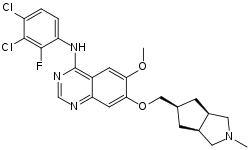Tesevatinib
 | |
| Clinical data | |
|---|---|
| Routes of administration | Oral administration (tablets) |
| Pharmacokinetic data | |
| Elimination half-life | 50–70 hours |
| Identifiers | |
| |
| CAS Number | |
| PubChem CID | |
| DrugBank | |
| ChemSpider | |
| UNII | |
| Chemical and physical data | |
| Formula | C24H25Cl2FN4O2 |
| Molar mass | 491.3919 g/mol |
| 3D model (JSmol) | |
| |
| |
Tesevatinib (KD019, XL647) is an experimental drug proposed for use in kidney cancer and polycystic kidney disease. The drug was first developed by Exelixis, Inc.[1] and was later acquired by Kadmon Corporation. Tesevatinib binds to and inhibits several tyrosine receptor kinases that play major roles in tumor cell proliferation and tumor vascularization, including epidermal growth factor receptor (EGFR; ERBB1), epidermal growth factor receptor 2 (HER2; ERBB2), vascular endothelial growth factor receptor (VEGFR), and ephrin B4 (EphB4).[2]
The drug activity was initially studied in non-small cell lung cancer.[3] In a 2007 pre-clinical study with xenograft tumors of an erlotinib-resistant cell line tesevatinib substantially inhibited the growth of these tumors.[4] In polycystic kidney disease, a histological study of the drug effects and toxicity in rats and mice was published in July 2017.[5]
As of July 2018 the drug was in Phase II clinical trials for the treatment of polycystic kidney disease in adults and children.[6]
References
- ↑ Gendreau, Steven B.; et al. (June 15, 2007). "Inhibition of the T790M gatekeeper mutant of the epidermal growth factor receptor by EXEL-7647". Clin. Cancer Res. 13 (12): 3713–3723. doi:10.1158/1078-0432.CCR-06-2590. Retrieved 30 October 2017.
- ↑ "Substance Name: Tesevatinib [USAN:INN]". US National Library of Medicine. Retrieved 30 October 2017. This article incorporates text from the United States National Library of Medicine, which is in the public domain.
- ↑ Carrizosa, MD, Daniel R.; et al. "New Targets and New Mechanisms in Lung Cancer (May 15, 2013)". CancerNetwork. UBM Medica, LLC,. Retrieved 30 October 2017.
- ↑ Gendreau, Steven B.; et al. (June 15, 2007). "Inhibition of the T790M gatekeeper mutant of the epidermal growth factor receptor by EXEL-7647". Clinical Cancer Research. 13 (12): 3713–23. doi:10.1158/1078-0432.CCR-06-2590. PMID 17575237. Retrieved 30 October 2017.
- ↑ Sweeney, William E.; Frost, Philip; et al. (July 6, 2017). "Tesevatinib ameliorates progression of polycystic kidney disease in rodent models of autosomal recessive polycystic kidney disease". World Journal of Nephrology. 6 (4): 188–200. doi:10.5527/wjn.v6.i4.188. PMC 5500456.
- ↑ "ClinicalTrials.gov - Tesevatinib". US National Library of Medicine. Retrieved 27 July 2018.